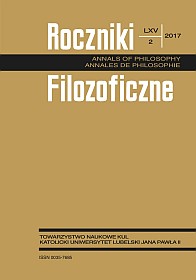Leibniz: Personal Identity and Sameness of Substance
Abstract
Leibniz’s theory of personal identity has been the object of numerous discussions and various interpretations. In the paper I contrast my view on Leibniz’s solution to the problem of personal identity with the view of Margaret Wilson and Samuel Scheffler. They both claimed that Leibniz failed to formulate a coherent, uniform and tenable theory of personal identity. His stance – as they state – contains so many inconsistencies that it cannot be adopted as a satisfactory solution to this problem. I disagree with this opinion. It is my conviction that a more inquisitive analysis of Leibniz’s texts leads to the conclusion that such severe criticism of the results of Leibniz’s studies of personal identity is ill-founded. My paper consists of two parts. In the first part—drawing on suggestions made by Vailati, Thiel, Noonan, and Bobro—I attempt to present the essential arguments against the interpretation offered by M. Wilson and S. Scheffler. In the second part I address two issues. First, I try to discuss the reasons which Leibniz listed to support his thesis that personal identity requires both the continuity of substance and the continuity of some psychological phenomena. Then, I turn to identifying Leibniz’s arguments which support the thesis that what ultimately provides a person with identity is their substantial principle, i.e. the soul or “I.”
References
Die philosophischen Schriften von G.W. Leibniz. Bd. I-VII, edited by Carl Immanuel Gerhardt. Berlin: Weidmann, 1875–1890 (abbr. GP).
G.W. Leibniz Philosophical Essays. Translated and edited by Roger Ariew and Daniel Garber. Indianapolis and Cambridge: Hackett Publishing Co., 1989 (abbr. AG).
Leibniz, Gottfried Wilhelm. New Essays Concerning Human Understanding. Translated and edited by Peter Remnant and Jonathan Bennett. 2nd ed. Cambridge: Cambridge University Press, 1996 (abbr. NE).
Leibniz, Gottfried Wilhelm. Opera philosophica omnia, edited by Johann Eduard Erdmann. Berlin: Scientia Verlag Aalen, 1840 (abbr. Erdmann).
Leibniz, Gottfried Wilhelm. Philosophical Papers and Letters. Translated and edited by Leroy E. Loemker. Dordrecht: D. Reidel, 1969 (abbr. L).
Leibniz, Gottfried Wilhelm. Theodicy: Essays on the Goodness of God, the Freedom of Man and the Origin of Evil. Translated by Eveleen M. Huggard, edited by Austin Farrer. Oxford: Biblio Bazaar, 2007 (abbr. Theodicy).
Bobro, Marc Elliott. Self and Substance in Leibniz. New York: Springer-Verlag, 2004.
Curley, Edwin M. “Leibniz on Locke on Personal Identity.” In Leibniz: Critical and Interpretative Essays, edited by Michael Hooker, 302–26. Minneapolis, Minn.: University of Minnesota Press, 1982.
Graganiec, Mariusz. “O tożsamości osobowej. Leibnizjańskie wątki koncepcji Rodericka M. Chisholma.” Przegląd Filozoficzny – Nowa Seria 100 (2016). 4: 405–19.
Jolley, Nicholas. Leibniz and Locke: A Study of New Essays Concerning Human Understanding. Oxford: Clarendon Press, 1986.
Mates, Benson. The Philosophy of Leibniz: Metaphysics and Language. New York, Oxford: Oxford Oxford University Press, 1986.
Mijuskovic, Ben Lazari. “Locke and Leibniz on Personal Identity.” The Southern Journal of Philosophy 13 (1975), 2: 205–214.
Noonan, Harold W. Personal Identity. London: Routledge, 1989.
Scheffler, Samuel. “Leibniz on Personal Identity and Moral Personality.” Studia Leibnitiana 8 (1976), 2: 219–240,
Thiel, Udo. “Personal Identity,” in The Cambridge History of Seventeenth-century Philosophy, edited by Daniel Garber and Michael Ayers, 868–913. Cambridge: Cambridge University Press, 1998.
Vailati, Ezio. “Leibniz’s Theory of Personal Identity in the New Essays.” Studia Leibnitiana 17 (1985), 1: 36–43.
Wilson, Margaret. “Leibniz: Self-Consciousness and Immortality in the Paris Notes and After.” in Margaret Wilson, Ideas and Mechanism, 373–387. Princeton: Princeton University Press, 1999.
Copyright (c) 2017 Roczniki Filozoficzne

This work is licensed under a Creative Commons Attribution-NonCommercial-NoDerivatives 4.0 International License.





